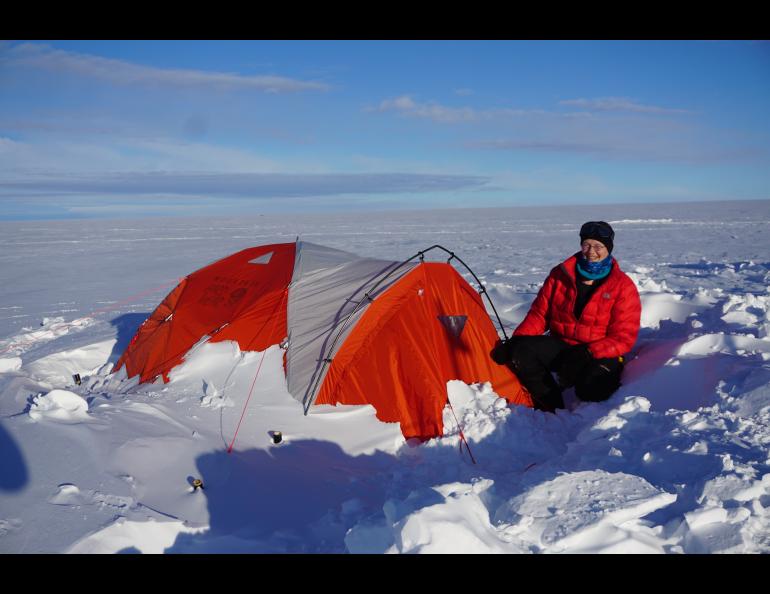Glaciologist Regine Hock has been awarded a top honor by the International Glaciological Society for her “long-standing and ongoing service in support of glaciology” with the society and beyond.
The International Glaciological Society announced Hock, a part-time faculty member at the University of Alaska Fairbanks Geophysical Institute, as the recipient of its 2021 Richardson Medal on Saturday. The medal is named after Hilda Richardson, who was hired in 1953 as the leader of the British Glaciological Society, which later became the International Glaciological Society. She led the society until her retirement in 1993.
Hock, who is also affiliated with the Department of Geosciences at the University of Oslo, Norway, was honored not only for her research but also for her involvement in the International Glaciological Society and in education.
“Regine is an outstandingly productive scientist; a prolific supervisor and mentor of postgraduate students, and is active in outreach to school students,” reads a statement from Awards Committee Chair Ian Allison announcing the award. “She initiated, organizes, and teaches at the International Summer School in Glaciology held in McCarthy, Alaska, every second year since 2010.”
Hock, who is an elected member of the society’s governing council, said the award was a big surprise.
“I had no idea that I was nominated and didn't expect it at all,” she said.
News of the honor from the leading international glaciology organization came just hours before Hock was to head out on a lengthy adventure.
“The president of the IGS was very anxious to get a Zoom meeting with me, but I was just about to go on a trip paddling down the Yukon, and I was thinking ‘Why is this so urgent and can’t wait?’ I thought we were going to be discussing some IGS business, which I frequently do with him.
“But he was really eager to talk to me,” she said, “and about 12 hours before I was to leave for the Yukon he got hold of me and told me that news and I was really blown away.”
The Richardson Medal is given to those who have provided “outstanding service” to the International Glaciological Society or the field of glaciology, defined as snow or ice studies.
Service is considered broadly but includes such efforts as those that “promote, grow or transform” the society and its activities or its scientific publications; education and outreach to the public; enhancing public understanding and awareness of glaciology; fostering the education, growth and involvement of early career scientists; and academic and leadership activities promoting glaciology.
Hock joined the society in 1995 as a glaciology graduate student. Since then she has served as council vice president and on committees and has been, according to the society’s announcement, “a champion for strengthening the IGS stance on inclusion and diversity.”
She has been an associate scientific editor of both the Journal of Glaciology and Annals of Glaciology. She established the open-access online journal Frontiers in Earth Sciences - Cryospheric Sciences and was its editor from 2015 to early 2021.
She led the Local Organizing Committee of the 2012 International Glaciological Society Symposium in Fairbanks and has served as secretary general of the Snow and Ice Hydrology Commission of the International Association of Hydrological Sciences.
“I always enjoy the interaction with colleagues around the world. And not just doing science but also furthering the cause of glaciology and helping to shape the professional organizations in a way that supports scientists and especially early career scientists.”
Hock is particularly interested in helping scientists who are just starting out.
“The young scientists are the future; it's really important to encourage them,” she said. “Decades ago, young scientists had very little chance to get involved. And I see now how important that is, and that's why I want to promote the next generation.”
Aside from her numerous glaciology research papers and collaborations, Hock also played a lead role in creating the Randolph Glacier Inventory, the first version of which was released in February 2012. The inventory is a collection of digital outlines of the world’s glaciers and supplements the Global Land Ice Measurements from Space initiative, an international effort to monitor changes to the world’s glacier mass.
Who does she credit with helping her succeed?
“I think the support early on from my Ph.D advisers, but then also work colleagues,” she said. “I've always been in a university or in a group where there are many glaciologists around me, like at the Geophysical Institute, where there is a very strong group. And that is inspiring.
“Also, being part of international organizations provides you with the dimension of an international network and potential collaborators,” she said. “So my advice to young, early career researchers is to get involved in organizations.”
Hock was a full-time Geophysical Institute faculty member until September 2020, when she became part-time at the institute upon joining the University of Oslo. She continues her work with graduate students and post-doctoral researchers in Fairbanks.
Hock will receive the Richardson Medal in person in November at an International Glaciological Society meeting in Oslo, Norway.
You can read the full IGS award statement here: www.igsoc.org/awards/richardson/hock.html



